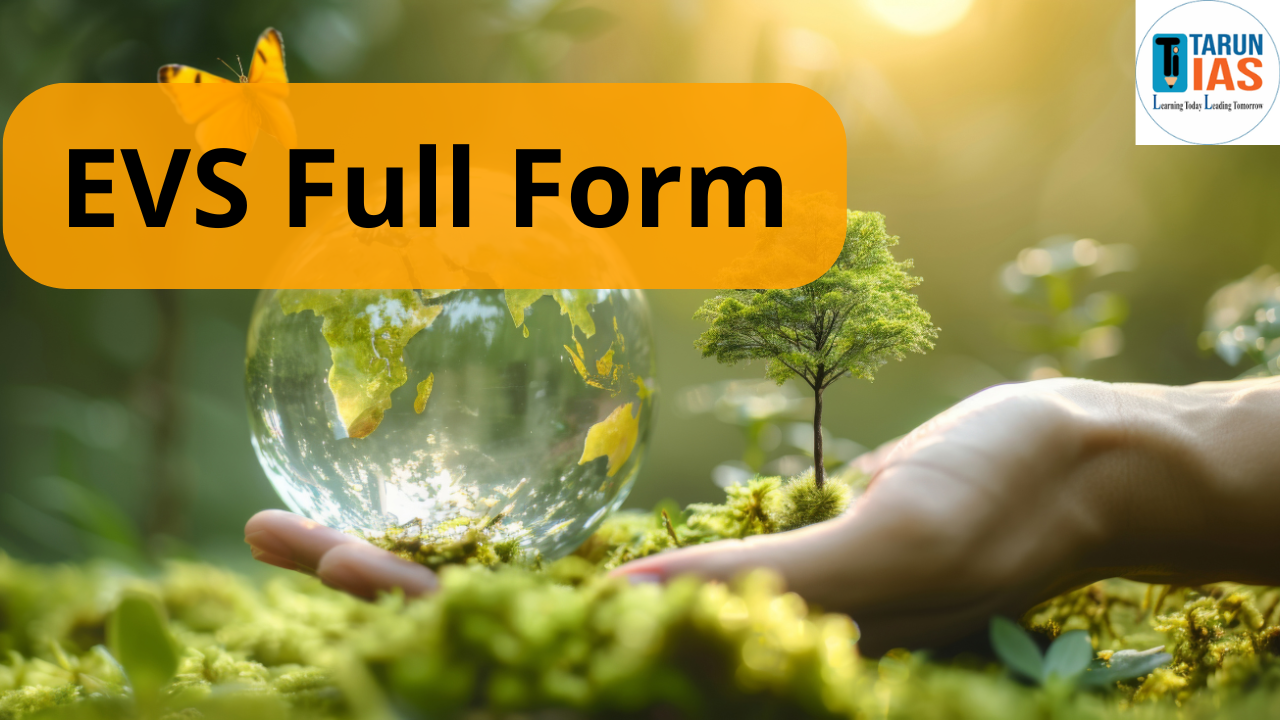EVS stands for Environmental Science or Environmental Studies. It is a subject that helps us understand the world we live in. especially nature and how everything in nature is connected.
In EVS, we study the air we breathe, the water we drink, the land we live on, and the plants and animals around us. But EVS is not only about nature. It also teaches us human actions. like cutting trees, using plastic, polluting rivers, and building factories are hurting the environment.
This subject shows us how our daily choices affect the Earth and teaches us how to take care of our surroundings. For example, EVS talks about saving water, using less plastic, recycling waste, and protecting animals.

EVS Full Form
The full form of EVS is Environmental Science. Sometimes, it is also called Environmental Studies. Both terms are used to talk about the same subject. a subject that helps us understand how humans and nature are connected.
EVS Environmental Contribution
By learning from EVS, you can help protect the environment in many ways. You can follow eco-friendly habits in daily life, spread awareness about environmental problems, support conservation efforts, join local green projects, and speak up for laws that safeguard nature.
EVS Topics Covers
Ecology
EVS studies how living things like plants, animals, and humans interact with their surroundings. It explains how ecosystems work, how energy moves through food chains, and why biodiversity is important.
Environmental Pollution
In the EVS we will know the sources and effects of pollution, such as water, air, soil and noise pollution. EVS explains how pollution harms nature and human health, and suggests ways to control it.
Natural Resource Management
EVS focuses on the wise use and protection of natural resources like forests, water, minerals, and animals. It highlights the dangers of overusing these resources and teaches how to conserve them for the future.
Climate Change
EVS explains the causes of climate change, such as greenhouse gases and global warming. It also shows how changing weather patterns affect life on Earth and suggests using clean energy and sustainable practices to reduce harm.
Environmental Policy and Governance
EVS looks at the laws and rules made to protect the environment. It studies how governments, international bodies, and people work together to make and follow environmental policies.
Environmental Education and Awareness
EVS aims to spread knowledge about environmental issues. It helps people understand problems and teaches them how their small actions.like saving water or planting trees,can help protect the planet.
Multidisciplinary Nature of EVS
Environmental Studies is not limited to just one subject. It brings together knowledge from many different areas like biology, chemistry, geography, sociology, economics, political science, and even geology. By connecting all these fields, EVS helps us see the bigger picture. how people, nature, and society affect each other and work together. This multidisciplinary approach gives students a broad and balanced understanding of environmental problems. It shows that issues like pollution, climate change, and resource loss are not just scientific matters, but also social, political, and economic. EVS encourages us to think in a more complete and thoughtful way about the challenges our planet faces today.
EVS Importance
EVS is important because it helps us understand the complex interactions within ecosystems, the impact of human activities on the environment, and the need for sustainable practices. It addresses environmental challenges such as pollution, resource depletion, climate change, and biodiversity loss, and promotes environmental stewardship and sustainability.
EVS Study Areas
EVS covers several important areas like ecology, pollution, natural resource management, climate change, environmental laws, and awareness programs. These topics help us clearly understand major environmental problems and the ways we can solve them.
EVS Career Opportunities
EVS offers many career options for those interested in the environment. You can become an environmental scientist, ecologist, conservationist, consultant, sustainability officer, policy analyst, educator, or even an environmental journalist. People in these roles work in different places like government departments, NGOs, research centers, companies, and schools or colleges.
EVS Full Form
What is the full form of EVS ?
The full form of EVS is Environmental Science or Environmental Studies. It is an important subject that helps us understand the relationship between humans and nature. EVS teaches us how our actions affect the environment and guides us in making eco-friendly choices to protect natural resources and ensure a sustainable future.
What are the main topics covered under EVS?
EVS covers a wide range of topics such as ecology, environmental pollution, natural resource management, climate change, environmental laws and policies, and awareness programs. It also includes a multidisciplinary approach that combines subjects like biology, geography, chemistry, sociology, and economics to study environmental issues holistically.
How does EVS help in protecting the environment?
EVS educates us on how to reduce pollution, conserve resources, use sustainable energy, and follow eco-friendly habits like recycling and saving water. It raises awareness about environmental problems and promotes community participation, helping individuals and societies make responsible choices for a healthier planet.
What career opportunities are available after studying EVS?
A degree in EVS opens up various career paths such as environmental scientist, ecologist, conservationist, sustainability officer, policy analyst, environmental consultant, educator, or journalist. These professionals work in government agencies, NGOs, research institutions, corporations, and educational institutions.
Why is the multidisciplinary nature of EVS important?
EVS brings together knowledge from different fields like science, social science, economics, and politics. This multidisciplinary nature helps students understand environmental issues from multiple perspectives and encourages a more complete and effective approach to solving real-world problems like pollution, climate change, and biodiversity loss.















